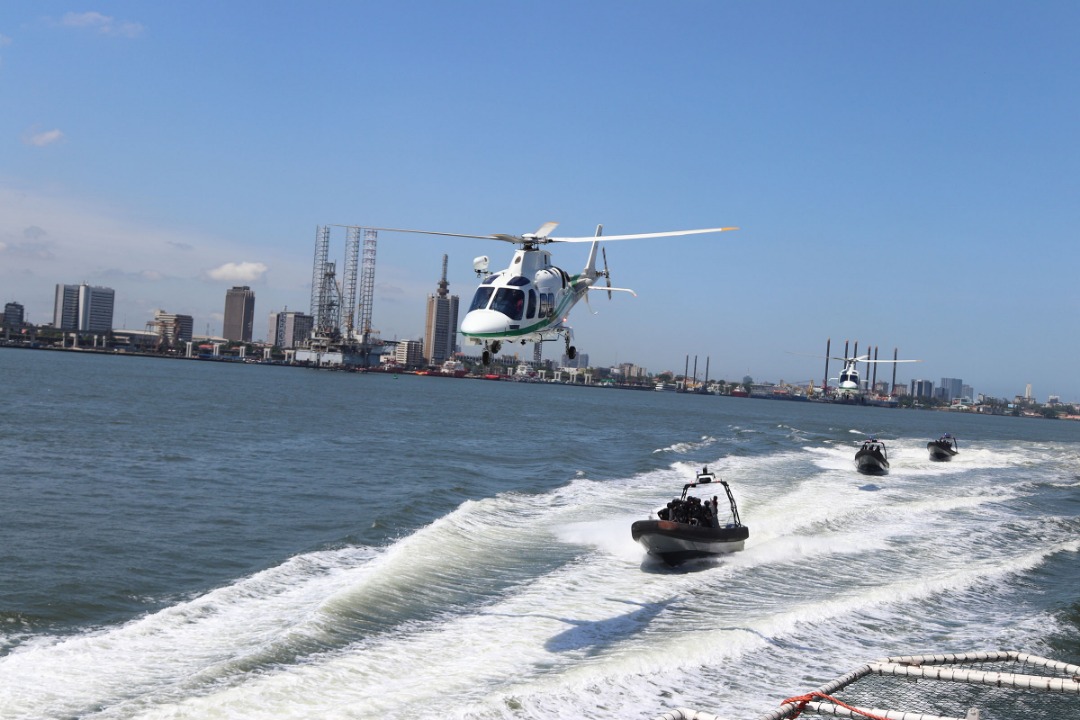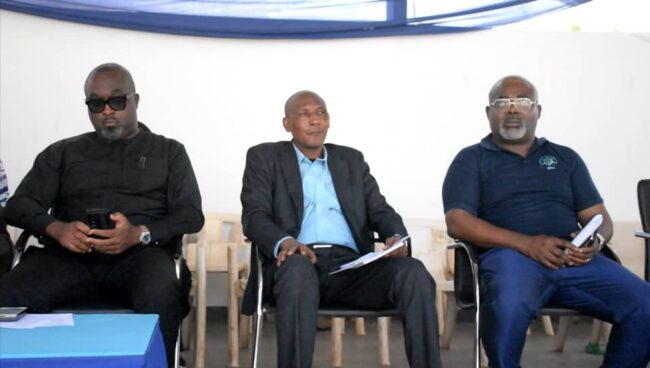Maritime
International Maritime Bureau confirms piracy decline in Gulf of Guinea

…BIMCO calls for Full deployment of Deep Blue Assets.
…Collaboration key to success-Jamoh
The International Maritime Bureau (IMB) in its half-year report of 2022 has lauded the reduction in piracy in the globe and expressed optimism that it is a new dawn for the shipping community globally.
This is coming on the heels of the Bureau receiving the lowest number of reported incidents for the first half of the year since 1994, evidencing its efforts in raising awareness to make the waters safe globally.
The Gulf of Guinea Declaration on Suppression of Piracy has confirmed that there has not been any case of Seafarers kidnap one year after the May 2021 declaration. This is considered commendable progress in comparison to the 2020 statistics when 130 seafarers were kidnapped. The status report from the GoG declaration also confirmed that there has not been any case of kidnap for ransom in 2022, as against 20 cases in 2020 and 12 in 2021.
The Director General of the Nigerian Maritime Administration and Safety Agency, NIMASA, Dr Bashir Jamoh said that Nigeria is committed to sustaining the momentum of the success recorded in recent times in the fight against piracy in the region. “It is heart-warming that the international maritime community is acknowledging the progress made so far. It is a direct result of collaboration amongst national, regional and non-regional stakeholders. It is our hope that this trend will be sustained and very soon, we will start reaping the benefits such as a change of status concerning the Insurance premium paid on Nigerian bound cargoes; the War Riskpremium being paid at the moment. We hope this status will change very soon. He said.
READ ALSO: NIMASA to deploy special mission aircraft to fight oil theft
While commending the progress, Baltic and International Maritime Council, BIMCO the world’s largest direct-membership organization for ship-owners, charterers, shipbrokers and agents called for the effective and full deployment of Deep Blue Assets on Anti-piracy tasking. Efforts of the Nigerian Navy in clamping down on pirates camps, the Deep Blue project C4i coastal surveillance and collaboration with international Navies for law enforcement off Nigerian waters and the series of meetings under the umbrella of the Gulf of Guinea maritime coordination Forum, Shared Awareness and DEconfliction, GoG/SHADE were identified as key to the success in the war against Piracy in the Region.
On its part, the International Maritime Bureau IMB hasalso confirmed that no case of vessel hijack took place in Nigerian waters in the first half of 2022. The ICC andInternational Maritime Bureau (IMB) have confirmed that the first half of 2022 witnessed the least cases of piracy globally in 28 years with only 58 reported cases as compared to 68 within same period in 2021. Of the 58 incidents, 2 were classified as Piracy attacks in the Gulf of Guinea, with NONE of them occuring in Nigerian waters. While the reduction in reported incidents is indeed encouraging, the IMB PRC continues to caution against complacency.
IMB Director, Michael Howlett said, “Not only is this good news for the seafarers and the shipping industry, it is positive news for trade which promotes economic growth. But the areas of risk shift and the shipping community must remain vigilant. We encourage governments and responding authorities to continue their patrols which create a deterrent effect.”
Maritime
CVFF- House of Reps Backs Marine & Blue Economy Ministry

The House of Representatives, through its Committee on Maritime Safety, Education and Administration, has pledged full support for the directive issued by the Honourable Minister of Marine and Blue Economy, Adegboyega Oyetola, for the Nigerian Maritime Administration and Safety Agency (NIMASA) to expedite the disbursement of the Cabotage Vessel Financing Fund (CVFF).
Speaking during an oversight visit to NIMASA, the Acting Chairman of the Committee, Hon. Uduak Alphonsus Odudoh, expressed satisfaction with the Agency’s progress and commended the leadership of Director General Dr. Dayo Mobereola for ongoing reforms that are repositioning Nigeria’s maritime industry for global relevance.
“I want to commend NIMASA and the Federal Ministry of Marine and Blue Economy for steps taken to disburse the CVFF which has been a challenge for over 20 years. This will translate to job creation for the maritime sector in Nigeria. The DG and his team have succeeded in maintaining no piracy in Nigerian waters and this translates to better image for Nigeria. We are supporting Nigeria’s quest to seek election into category C at the IMO and hopefully we will win. The DG told us that NIMASA is domesticating a record 56 conventions in one fell, swoop. This is fantastic. The global maritime community will see us as a serious maritime nation. we are committed to work, collaborate with NIMASA, collaborate with the Ministry of Marine and Blue Economy, for the success of this present government and the success of Nigeria.” the law maker declared.
ALSO READ: Jude Okoye Freed After Two-Month Detention Over Alleged N1.38bn Fraud
On his part, Dr Mobereola, welcomed the delegation and expressed appreciation for the cordial relationship that exists between the Agency and the House Committee. He lauded the Committee’s role in shaping governance and policy direction for the maritime sector, noting that such oversight and support are crucial to the Agency’s continued success. He confirmed that the Minister’s directive on the CVFF disbursement is a fait accompli.
He assured that “We are acting in accordance with the directive of the Honourable Minister to ensure indigenous shipowners finally have access to this critical funding. The guidelines have been streamlined based on the Minister’s approval, so beneficiaries can access the funds this year.”
To manage the $700 million intervention fund efficiently, NIMASA has expanded the number of Primary Lending Institutions (PLIs) from five to twelve.
The banks will play a key role in risk assessment, ensuring that only credible, financially capable shipping firms benefit from the revolving fund.
The funding model will see banks contribute 35%, NIMASA 50%, and the remaining 15% as equity from the shipowners themselves.
“By involving the banks, we are ensuring financial discipline and sustainability, which are crucial for this fund to continue long-term,” the DG explained.
“We are creating a win-win scenario—access to finance and access to business,” Mobereola said.
Maritime
Shettima Urges Stronger Synergy Among MDAs For Nigeria’s Business Environment

The Vice President of the Federal Republic of Nigeria, Senator Kashim Shettima, has called on Ministries, Departments, and Agencies (MDAs) of government, as well as members of the Presidential Enabling Business Environment Council (PEBEC), to deepen collaboration so as to foster a more conducive environment for doing business.
He made the assertion in Abuja, at the closing session of the PEBEC Retreat for heads of MDAs and MDA Reform Champions.
According to Sen Shettima the overarching goal is to ensure Nigeria remains a preferred destination for investors.
ALSO READ: SNEPCo, Former MD Aiboni Win Energy Times’ Awards
He stated, “This retreat was convened by the Presidential Enabling Business Environment Council (PEBEC), an institution I am privileged to chair, not just to review reform progress, but to deepen something even more critical: synergy.
The business of government is too complex to be solved in silos. We cannot afford the luxury of working in isolation, while the problems we are tasked to solve are increasingly intertwined.”
Among the attendees was the Director General of the Nigerian Maritime Administration and Safety Agency (NIMASA), Dayo Mobereola, who commended PEBEC for organizing the retreat.
He noted that it provided a valuable platform for peer review and constructive engagement among Federal Government appointees, aimed at improving institutional performance and reform delivery.
Maritime
NIMASA Dangles Opportunities Before Private Investors At Enugu Int’l Trade Fair

The Nigerian Maritime Administration and Safety Agency (NIMASA) has urged the private sector to seize emerging opportunities in Nigeria’s Blue Economy, particularly in the maritime sector.
The Director General of NIMASA, Dr. Dayo Mobereola made the call at the ongoing 36th Enugu International Trade Fair.
The NIMASA DG who was represented by the Deputy Director in the Planning Research and Data Management Service Department of NIMASA, Umar Mohammed highlighted NIMASA’s commitment to implementing the Renewed Hope Agenda of the Federal Government, while also emphasizing the need for inclusive economic growth through indigenous participation in domestic and international shipping.
ALSO READ: Shell Commends Oloibiri Lecture Series As Platform For Change
“To unlock the full potential of our maritime economy, NIMASA is pursuing an integrated development strategy that will support indigenous operators in ship acquisition, establish a National Carrier Line, and create maritime training institutions for world-class seafarers,” he stated.
He noted that the Agency is also implementing a Public Sector Cargo Support Programme aimed at creating a captive freight market for local carriers and reducing the dominance of foreign shipping lines in Nigeria’s seaborne trade.
Accordingly, he said the Agency’s strategic initiatives are being driven through public-private partnerships to ensure sustainability and long-term impact.
“Therefore, we are inviting investors and entrepreneurs to collaborate with us in developing a robust and competitive maritime sector that will create jobs and boost the national economy,” he added.
The NIMASA DG through his representative used the opportunity to express appreciation to the Governor of Enugu State, Dr. Peter Ndubuisi Mbah, and the leadership of the Enugu Chamber of Commerce, Industry, Mines and Agriculture (ECCIMA) for hosting the trade fair, which he described as a vital platform for business networking and investment drive.
The NIMASA plays a key role in promoting the Blue Economy in Nigeria with its promotional responsibilities, being part of its mandate to regulate maritime activities and ensure sustainable use of ocean resources.












